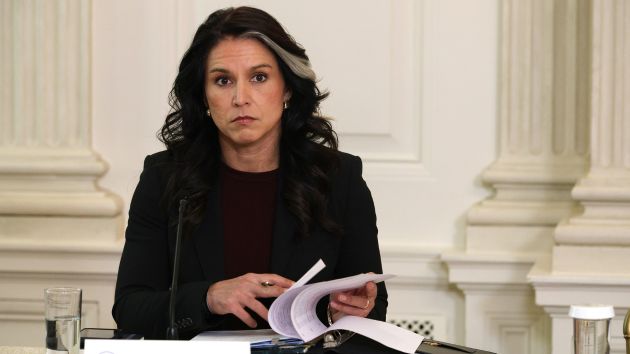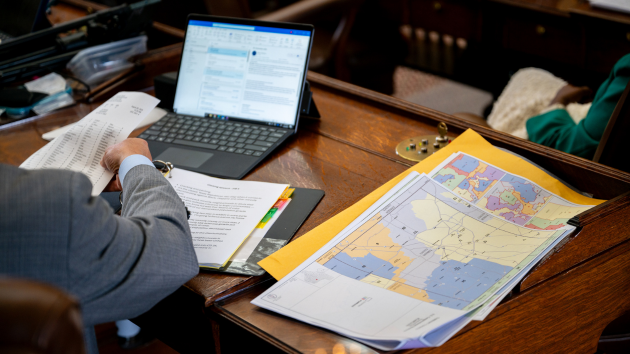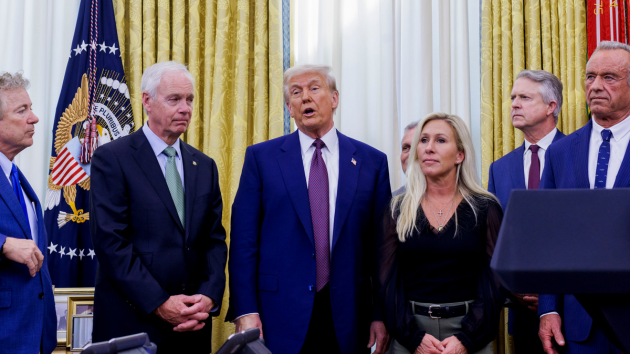14th Amendment challenges to Trump’s campaign fail in 2 states with Colorado case pending
Written by ABC Audio ALL RIGHTS RESERVED on November 15, 2023

(WASHINGTON) — Former President Donald Trump is gradually shaking off attempts to bar him from individual states’ 2024 ballots under Section 3 of the 14th Amendment, a constitutional clause which disqualifies people from running for office if they previously held office, swore an oath to the Constitution and then engaged in “insurrection or rebellion” against the U.S.
Judges in Michigan and Minnesota over the past two weeks have ruled that Trump, the 2024 Republican primary front-runner, can be on the ballot in both states, dismissing lawsuits filed by citizens and watchdog organizations that claimed the former president should be barred because of his actions around the Jan. 6, 2021, riot at the U.S. Capitol and efforts to reverse his 2020 election loss.
Trump’s team has rejected that argument, claiming it is undemocratic and a fringe theory. He has denied all wrongdoing related to Jan. 6.
The remaining major lawsuit seeking to disqualify Trump under Section 3, in Colorado, could be decided by the end of the week.
Trump’s challenge from six Republican and unaffiliated voters in Colorado, represented by the watchdog group Citizens for Responsibility and Ethics in Washington (CREW), will wrap up on Wednesday evening with closing arguments in Denver.
No ruling is expected directly afterwards, but District Judge Sarah B. Wallace has said she would likely make a decision on the suit within 48 hours and definitely before Thanksgiving.
Wallace uniformly ruled against a number of Trump and the Colorado Republican Party’s motions to dismiss the lawsuit ahead of a historic five-day evidentiary hearing at the beginning of November.
She also denied their motion for a directed verdict to dismiss the case on day two of the hearing, when they argued after the petitioners’ slate of witnesses that Trump’s speech on Jan. 6 before the attack did not disqualify him from candidacy due to the First Amendment.
The Trump campaign on Wednesday issued a statement again calling for the case to be dismissed.
At the evidentiary hearing, CREW brought in expert witnesses to discuss political extremism and testify about the phrase “insurrection” and the history and meaning of Section 3 of the 14th Amendment.
CREW also called two police officers who were at the Capitol on Jan. 6 and California Rep. Eric Swalwell, a Democrat who was inside.
Among the witnesses that Trump’s attorneys called were former Trump administration official Kash Patel, former Trump campaign spokeswoman Katrina Pierson and another organizer of the event near the White House on the morning of Jan. 6 where Trump spoke to supporters before some of them marched to the Capitol.
His attorneys also called retiring Rep. Ken Buck, a Colorado Republican who has spoken out against 2020 election denialism but also criticized the work of a House committee that investigated Jan. 6 — efforts that were largely similar to CREW’s new case.
On Tuesday the Michigan Court of Claims dismissed two 14th Amendment lawsuits against Trump which challenged his eligibility to appear on the state’s primary election ballot in 2024.
A third lawsuit, which Trump’s team filed, asked Judge James Robert Redford to declare that Michigan’s Secretary of State Jocelyn Benson, a Democrat, does not have the authority to determine whether a candidate can be disqualified from the state’s primary ballot.
Redford granted that request on Tuesday, finding that it was Congress’ role, not the judicial branch, to decide on the matters of Trump’s eligibility.
The judge also ruled that under state law, he did not have the power to order election officials to examine Trump’s eligibility based on the 14th Amendment.
Free Speech For People (FSFP), one of the groups behind the 14th Amendment challenges, argued one of the cases against Trump in Michigan. The group told ABC News in a statement that they will file an immediate appeal to the Michigan Court of Appeals and will ask the Michigan Supreme Court to take up their case directly.
Activist Robert Davis, who filed the second lawsuit in Michigan, has also said he plans to file an emergency stay to pause the lower court ruling.
Experts have said that an appeal for any of these disqualification cases could make its way up to the U.S. Supreme Court.
The orders in Michigan follow a ruling from the Minnesota Supreme Court on another FSFP lawsuit last week that found Trump is allowed to remain on the state’s primary ballot but did not rule on the petitioners’ constitutional argument that Trump’s actions ahead of Jan. 6 amounted to him “engaging in insurrection.”
The Minnesota order also did not stop the challengers from “bringing a petition raising their claims” as it relates to the general election rather than just the Republican primary.
FSFP has not made clear if they will file an appeal in Minnesota.
The former president’s campaign responded to the dismissals out of Michigan and Minnesota, claiming the courts’ rulings validated their arguments that Section 3 of the 14th Amendment is being used to interfere with the election.
“Each and every one of these ridiculous cases have LOST because they are all un-Constitutional left-wing fantasies … seeking to turn the election over to the courts and deny the American people the right to choose their next president,” Trump spokesman Steven Cheung said.
“While the Trump Campaign welcomes these dismissals in Michigan and anticipates the future dismissals of the other 14th Amendment cases, we are most focused on once again winning the great state of Michigan and the re-election of President Trump next year,” he continued.
While Trump won Michigan in 2016, over Hillary Clinton, he narrowly lost it to Joe Biden in 2020.
ABC News’ Hannah Demissie contributed to this report.
Copyright © 2023, ABC Audio. All rights reserved.

 KVSP
KVSP 




